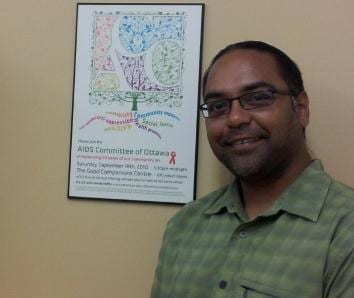Khaled Salam, acting executive director of the AIDS Committee of Ottawa (ACO), says his organization is extremely disappointed by the messages the recent Steven Boone HIV trials send to the public and men considering getting tested for the virus.
He says the court proceedings further perpetuate “fear mongering” and will ultimately scare gay men from being tested.
“Decisions that were made are unfortunately going to be a barrier in doing effective HIV prevention work,” he says. “Statistics clearly point to the fact that close to 30 percent of people living with HIV in Canada are actually not aware of their HIV status. We know for a fact that going out and getting tested is a huge form of HIV prevention.”
Salam says the recent Supreme Court decision in two cases of nondisclosure coupled with the Boone trials are a “double whammy” to the HIV community.
“In one way we felt it was a strong step forward, in that the Supreme Court finally recognized that disclosure is not a legal obligation under all circumstances,” he says. “The Supreme Court recognized that if a person living with HIV has a low viral load, or an undetectable viral load, and combines it with the effective use of a condom, then they won’t have to disclose their status.”
Yet ACO, like many other HIV/AIDS organizations, finds it disheartening that the Supreme Court decision leaves the door open for federal prosecution in the future. Having a low viral load depends on various social conditions, Salam says, such as adequate access to healthcare and equitable access to treatment.
“For folks who are low income; for folks who are marginalized in our society, having a low viral load is not as easy as it appears to be,” he says. “A very complex social issue was simplified in this decision.”
As for the ACO’s support for the decriminalization of HIV nondisclosure, Salam points to the United Nation’s Statement on Criminalization of HIV Transmission and Exposure, released in 2008.
“[The document] talks about destigmatizing HIV. Stigma is one of the greatest barriers, and criminalization only further stigmatizes people living with HIV. We feel that HIV is a health issue and a medical issue. It’s not a criminal issue,” he says. “We definitely acknowledge that there may be some situations where there might be a crossover with the law.”
ACO staff attended both Boone trials and provided the accused with support services. Salam says ACO does not support anyone who maliciously infects others with HIV, yet this is exactly what the Crown lawyers say Boone is guilty of.
Prosecutors Meaghan Cunningham and Louise Tansey-Miller referenced several internet chat transcripts as evidence Boone did intend to infect others. Boone’s defence lawyer, Ian Carter, argued the transcripts point only to a rich fantasy life.
“None of us were there,” Salam says. “The whole Steven Boone case and the way it has been portrayed is not an accurate reflection of the work that our organization does and the people that we work with. We don’t condone the actions of Steven Boone as they have been reported.”
The ACO will not take a stance on whether Boone is guilty or not. The organization would rather look at the larger picture and the negative impact criminalizing HIV nondisclosure will have on the HIV-positive community.
Boone has already been convicted on three counts of attempted murder. He could be convicted of a fourth count when the judge sentences him in this most recent trial.
Salam says equating HIV with death is an archaic view.
“There have been tremendous advancements in medication and treatment when it comes to HIV/AIDS,” he says. “If people know about their status; if people access healthcare, medication, treatment and social support, absolutely not, HIV/AIDS is not a death sentence. People can live long and healthy lives.”
On Nov 20, Justice Bonnie Warkentin said she will decide on sentencing after Dec 19.


 Why you can trust Xtra
Why you can trust Xtra


